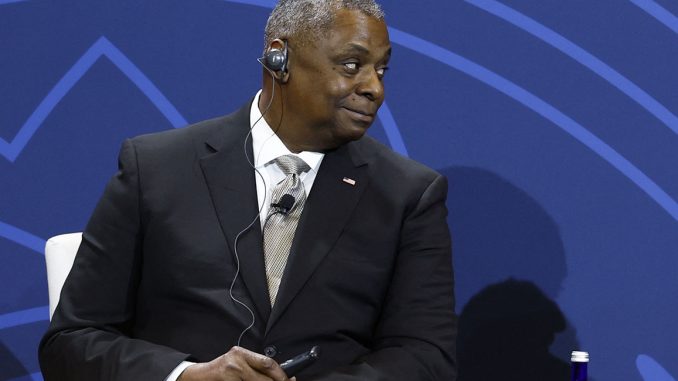
In early 2021, Defense Secretary Lloyd Austin fired all the members of 42 separate defense advisory boards and suspended operation of the panels until the Pentagon could do a “zero-based” review.
The Defense Department sponsors these advisory boards to provide the Pentagon advice on matters such as business operations, innovation, health care, retirement, and operation of the military academies. After a seven-month review, Austin restarted many of the defense advisory boards, but with new slates of members.
Now, according to a new Heritage Foundation analysis of the makeup of 11 of the most influential advisory boards between 2019 and 2022, the number of Democrats on the panels increased in every single case except one. (The Daily Signal is Heritage’s multimedia news organization.)
Austin’s purge may have been prompted by a perception that the Trump administration had, in its waning hours, installed individuals such as former 2016 Trump campaign manager Corey Lewandowski and former 2016 deputy campaign manager David Bossie on the influential Defense Business Board, among members on other boards.
Of the hundreds of advisory positions, about 30 members were replaced in the final months of the Trump administration. Those 30 likely represented around 10% or less of the total number of defense advisory board members.
Nevertheless, Austin’s action was unprecedented. Never before had there been an across-the-board suspension and firing of all of the Pentagon’s advisory board members, either coincidental to a change in administration or at any other time.
As a consequence, distinguished retired military officers such as Army Gen. Jack Keane and Army Lt. Gen. H.R. McMaster, West Point alumni both, were unceremoniously booted from the Military Academy’s Board of Visitors. Ironically, on nearly the same day he was shown the door, McMaster received West Point’s Distinguished Graduate Award.
Another one of the Trump appointees was Meaghan Mobbs, an Afghanistan veteran, clinical psychologist, and former Army captain. When Mobbs was fired from the West Point board, she remarked: “When I joined the board under the Trump administration, there were holdovers from the Obama administration. They were not terminated, but instead served alongside Trump appointees.”
Other long-term board members similarly were kicked off boards.
Heritage based its analysis on board makeups on clear indications of a political identification among members. If any doubt existed, an appointee was presumed to be “neutral.” The starting year of 2019 was chosen deliberately to remove any suggestion that the statistics were skewed by last-minute Trump appointees.
A total of 33 Democrats and 31 Republicans served on the selected 11 advisory panels in 2019. In 2022, the count was 61Democrats, nearly double the number three years earlier, and 30 Republicans, or one less.
In 2019, the Defense Innovation Board was 8% Republican and 42% Democrat. The reconstituted board is now 13% Republican and 63% Democrat.
Other advisory boards shifted more markedly. In 2019, the influential Defense Policy Board was 70% Republican and 30% Democrat. By 2022, the table had flipped to 35% Republican, 41% Democrat. The West Point Board of Visitors shifted from 46% Republican and 26% Democrat in 2019 to 47% Republican and 33% Democrat.
Other boards are weighted more dramatically. The new Defense Advisory Committee on Diversity and Inclusion has no ostensible Republicans among its 18 members—presumably members should have little trouble coming to consensus in their views.
Until 2021, these defense advisory boards historically were nonpartisan and their members served terms of at least three years. Members were selected based on expertise and knowledge, not political affiliation. With the Pentagon-directed shifts in the makeup of the boards, that norm now appears to have been altered.
With this as precedent, what does the future hold? Will each incoming defense secretary now flush out serving advisory board members in favor of replacing them with a more ideologically friendly group of advisers? Or was this just a one-time aberration?
In the latest National Defense Survey by the Ronald Reagan Institute, 62% of Americans linked their decreased confidence in the U.S. military to a perception that military leadership is becoming overly politicized.
It seems they might be on to something.
Have an opinion about this article? To sound off, please email letters@DailySignal.com and we’ll consider publishing your edited remarks in our regular “We Hear You” feature. Remember to include the url or headline of the article plus your name and town and/or state.

